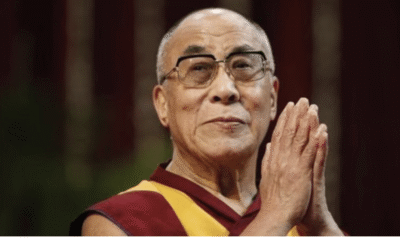|
Getting your Trinity Audio player ready...
|
For the first time, the birth anniversary of Atalji would be celebrated after he left his physical existence. The man who established connect with almost four generations of Bharat strongly provided the nationalist narrative through his journalism, poetry, speeches, foreign policy, public policy and even politics. Through his politics of positivity and humility, he would continue to be the guiding force for the emerging Bharat
Atal Behari Vajpayee was an accomplished journalist and poet, orator par-excellence, a true party karyakarta, a disciplined swayamsevak and along with all these he was a gentle and lovable human being. Atal ji was an institution in himself. Whoever came in contact with him, certainly came back as a enriched person. He left an indelible imprint on the life on thousands if not millions through his personality as well as politics. With his demise, naturally a political era marked by conciliatory, not competitive and not conflicting, a political era which was not marked by power-friendly politics, such an era of politics has come to an end.
In Gita it is said whoever is born shall die. But the mother earth and humanity shall be poorer by the passing away of statesmen like Atal ji. Some called him a fatherly figure, some called him a statesman, some said he was a true democrat, for some he was a man of speech, for some he was Babji. Lata Mangeshkar called him Dada. Americans remember him through his description of America-India relationship as natural allies. Chinese remembered him as the only Indian leader to have met three successive generations of the Chinese leadership starting with Mao-Tse tung to Deng Xiaoping to Hu Jintao. Bangladeshis remember him for his contribution in the liberation war. Many would not know that Atal ji was presented with the highest Bangladesh Liberation award. Even the Kashmiri separatist leaders remember him as one who sincerely wanted to solve the Kashmir problem. Atal ji’s demise is an irreparable loss to contemporary India.
Atal ji practised a version of politics that is rare to find today. His politics of love to the nation took precedence over the love of power. It was politics in which feelings, sentiments, emotions found a place in the world of cut throat competitive politicking. Atal ji practised a different version of politics which involved not disrespecting adversaries, not rejection of others, and not politics of name calling.
His life was an open book and led a transparent life. He was the same within and outside. His personal and political life was an open book like that of Gandhi. Everybody loved him and cared for him and admired his courage of conviction. Despite this, he never held himself above the party and was a true swayamsevak. He obeyed the decisions of the party as a disciplined karyakarta even at times when he did not agree with some of those. Walter Anderson, eminent political thinker, had said politics and discipline do not go together and the only exception was Atal Behari Vajpayee.
Today though we have done away with untouchability in social life, yet we acquired a new kind of scourge called political untouchability. No two people from two different parties see eye to eye. But Atal ji practised a goodwill politics who had even good words for his adversaries including Pt Nehru.
While Nehru had said Atal ji would occupy his position one day, Atal ji had paid genuine glowing tribute to Nehru when the latter passed away. This quality Atal ji maintained till the end of his life.
Atal ji was compassionate towards the karyakartas. Whatever position he was in, he never displayed any arrogance. I have my own experience to narrate. As a young man in his 20’s, in 1993 I was sent to interview Atal ji from my magazine when he was the leader of the opposition. This was a few months after the fall of disputed structure in Ayodhya and I had a few uncomfortable questions to ask. Atal ji did not get angry; instead he nudged me through the interview for 15 minutes giving all answers peacefully.
Though he had to rush to the Parliament and was reminded by another Minister, he said, “…Wait, I am teaching journalism to this young Pracharak from Andhra Pradesh”. One of the significant initiatives of Atal ji government was to constitute a committee to look into the functioning of the Constitution. This was in 2000. The committee was portrayed in bad light by media and showcased it as a review committee while its aim was to look into the effective working of the Constitution. Dr Ambedkar gave the Constitution for the people but warned that however good the Constitution if it goes into the hands of bad people its purpose would not be served. People are the real masters.
Former British Diplomat Carne Ross in his book Leaderless Revolution said democracy facilitates an agreement between the elector i.e. the people and the elected i.e. the government. Democracy is a direct agreement between the elector and the elected. People usually know only that part of the Constitution that affects them. Even though we promulgated the Constitution is 1950, we never made any effort to educate people about it. Thanks to Prime Minister Modi, in 2015 it was decided to observe November 26th every year as Constitution Day, so that people understand what the Constitution stands for. It is due to this lack of awareness among the large section of the society is being misused by certain organisations within and from outside to wreak havoc in the country. Dr Ambedkar had warned us against such misuse. India had lost Independence due to the infidelity and treachery of some of our own people. If some of our own betray us again, we may lose Independence and force us into slavery again and we should guard ourselves against repeating this.
Let me enumerate four major challenges. First, failure of the Constitution Governance is a challenge. Among the 3 limbs of the Constitution, the judiciary seems to be passing through a tumultuous time.
We know that justice delayed is justice denied but few opine that justice hurried is also justice denied. In the Ram Janmabhoomi case, the Allahabad High Court had ordered the trifurcation of the disputed land. The case was brought to the SC only to decide if the HC order was valid or not.
However, the opposing parties posed question on mosque being integral part of Islam or not to delay the judgment. When it came up for consideration, the Chief Justice took just three minutes and disposed the hearing saying that it was not a priority. It was due to such dismissal by the SC as not a priority we saw large scale demonstrations across the country by the temple protagonists. People showed that it was indeed a priority by participating in lakhs all across the country.
The second challenge comes from the bureaucracy. This is about the entire system of bureaucracy and not individuals. This system has become a hurdle of development. Former President of India Shri Pranab Mukherjee himself had said this. As a system, it is unaccountable and poses a big challenge to constitutional governance. Dr Ambedkar in his speech had said that if political parties keep creed above the country, our Independence will be put in a jeopardy the second time. For Vajpayee country was a temple, we are priests of it and we must sacrifice our lives in the service of the Rashtrapurush. This was politics for Atal Behari Vajpayee. When he was defeated in 1997 after 13 days in power, he spoke in the Parliament and said that parties come and go, governments come and go but the nation has to be there and democracy has to be there forever. But today parties are shrinking and there is only one national party and rest are regional parties. The reason for this is that the identity politics is at its zenith. Identity based on caste, language, region etc. is dictating the politics of today and this is a global phenomenon. This is a challenge for the Constitution to deliver.
The next challenge comes from outside. It comes from the teflon coated liberals who know how to use systemic loopholes and how to subvert the system, including the judiciary. Their agenda is familiar. They throw a big challenge to the solemn agreement between the people and its rulers which is in form of the Constitution. This includes some intellectuals and NGOs. There are genuine NGOs who work for a good cause but there are many who misuse the system. As in the case of Sabarimala, which was challenged by those who were not even believers on the basis of gender equality. They were out to teach gender equality to a matriarchal society like Kerala where women lead social and family life. Sadly the SC gave a judgment in their favour. The Marxist Kerala government wants woman to enter which is ironical. Women themselves do not want to enter and such cases throw a challenge to the agreement between the people and the state. Article 25 to 30 give religious institutions including Hindu institutions the right to manage their affairs as per their traditions.
In case if Rafale deal, those who went to court had only one aim which was to blame the Government. The Congress was only trying to prove that since they are already robbers, wanted to show someone else also as a thief. However the SC dismissed their charges and noted that all procedures followed was right. But certain intellectuals and NGOs wanted to subvert the system for their own nefarious purposes. Such intellectuals and NGOs throw a big challenge to us. It was to these challenges that Dr Ambedkar was referring to.
Atal ji was a poet. He was a man of thought. In the rustle and rumble of politics, he used to turn to poetry as a relief. He had said that his poetic heart gave him the strength to face the political problems particularly those that have a bearing on his conscience. He was a man of emotions and was humility personified. It is difficult to find humility in politics and Atal ji in his poem requests god not to take him to heights where he cannot reach his own people. Atal ji showed us how to accept success and failures without attitude. He used to say that one should take victory and defeat with equanimity and only a humble leader could live a life like that.
Today, it is not easy to survive in politics as it can be harsh. It is not possible to state the truth in politics. But Atal ji practiced politics of honesty and accommodation. He had set an example as a politician and had no enemies. Hence, he was called ‘Ajatashatru’. He was honest to himself and was transparent before the nation. He never believed that he was always right. If someone believes that he is always right, that is the starting point of hate. Atal ji through his life and politics has been an living example for us all. With the passing away of Atal ji, an era has come to an end. It is true that it is difficult to find another Atal ji. But the era of politics he ushered in, the politics of positivity, politics of compassion and dignity, politics of humility will guide us forever.
(Excerpts from the first Atal Bihari Vajpayee Memorial Lecture delivered by Shri Ram Madhav; organised by Thinkers Forum, Bengaluru, on December 17, 2018. The article was originally published in Organiser on December 25, 2018)



